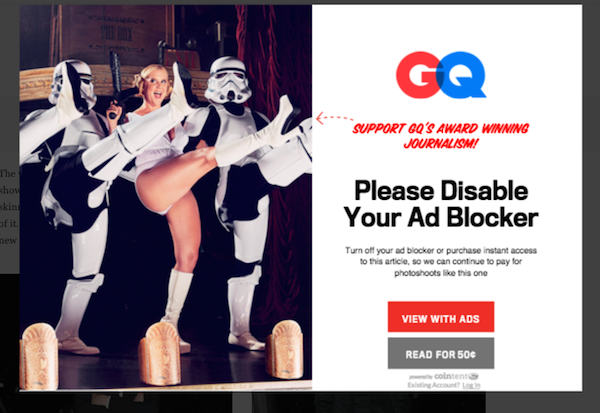
Condé Nast is the latest publisher to join the war on ad blocking. Its GQ magazine is preventing people using ad blockers from accessing its site with a popup asking them to disable their ad blockers or pay 50 cents to read an article.
GQ isn’t the first publication to take a hard line in forcing people to disable their ad blockers. Forbes has a message on its welcome screen asking people to turn off their ad blockers in order to access the site (but to soften the blow, it’s promising an ad-light version of the site in exchange).
Other publishers have taken a gentler approach, serving friendly messages to ad block users asking them to disable their ad blockers.
For the payment part, GQ is using CoinTent, a micropayment system started earlier this year that lets publishers charge for access to an article or video. Once you click the pay button, you’re prompted to set up an account with a digital wallet that’s designed to make it easy to buy content around the Web. CoinTent’s site also lists another Condé Nast site Epicurious as a client. GQ and Condé Nast haven’t responded to requests for comment.
Ad blocking has become a major concern among mainstream publishers this past year as consumers, fed up with ads clogging their surfing experience and worried about their online privacy, have begun ad blocking in big numbers. Ad blocking means lost revenue for publishers as it means fewer eyeballs to sell ads against.
More in Media

Digiday+ Research: Dow Jones, Business Insider and other publishers on AI-driven search
This report explores how publishers are navigating search as AI reshapes how people access information and how publishers monetize content.

In Graphic Detail: AI licensing deals, protection measures aren’t slowing web scraping
AI bots are increasingly mining publisher content, with new data showing publishers are losing the traffic battle even as demand grows.

In Graphic Detail: The scale of the challenge facing publishers, politicians eager to damage Google’s adland dominance
Last year was a blowout ad revenue year for Google, despite challenges from several quarters.






